形容词变副词的教学变化规则及练习
形容词变副词的变化规则(名词修改):形容词与副词的区别

形容词变副词的变化规则(名词修改):形容词与副词的区别形容词和副词是英语语法中常见的两种词性,它们在句子中的作用和用法有所不同。
下面将介绍形容词变副词的变化规则以及形容词与副词的区别。
形容词变副词的变化规则形容词变副词的变化规则可以通过在形容词后添加特定后缀来实现。
下面是一些常见的变化规则:1. 对于以辅音字母结尾的形容词,通常将字母"y"改为"i",再加上后缀"-ly",如:happy → happily;lucky → luckily。
2. 对于以"le"结尾的形容词,通常去掉"e",再加上后缀"-ly",如:simple → simply;gentle → ___。
3. 对于以"ic"结尾的形容词,通常直接加上后缀"-ally",如:automatic → automatically;tragic → tragically。
4. 对于以"y"结尾的形容词,若其前面是元音字母,则直接加上后缀"-ly",如:gay → gayly;loyal → loyally。
需要注意的是,并非所有形容词都可以通过添加后缀来变为副词,有些形容词的副词形式是不规则的,需要单独记忆和研究。
形容词与副词的区别形容词描述或修饰名词,用于对名词进行叙述或说明。
例如:- This is a beautiful flower.(形容词)beautiful flower.(形容词)beautiful flower.(形容词)- She has a big house.(形容词)big house.(形容词)big house.(形容词)副词描述或修饰动词、形容词、副词或整个句子,在句子中用于修饰其他词语或表示方式、程度、时间等。
形容词变副词 练习题
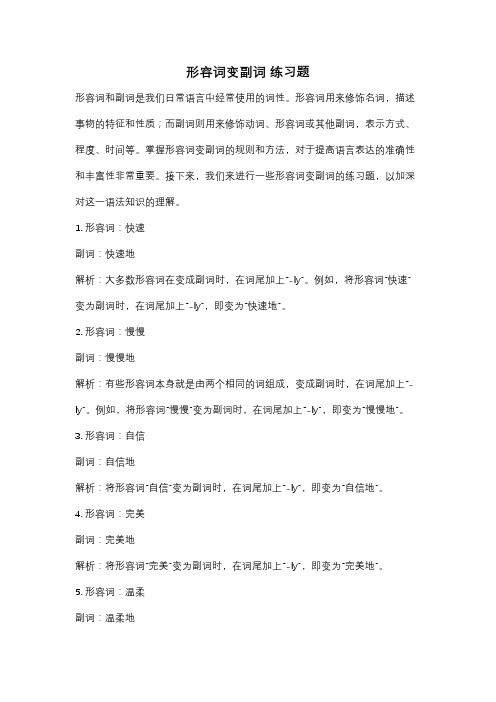
形容词变副词练习题形容词和副词是我们日常语言中经常使用的词性。
形容词用来修饰名词,描述事物的特征和性质;而副词则用来修饰动词、形容词或其他副词,表示方式、程度、时间等。
掌握形容词变副词的规则和方法,对于提高语言表达的准确性和丰富性非常重要。
接下来,我们来进行一些形容词变副词的练习题,以加深对这一语法知识的理解。
1. 形容词:快速副词:快速地解析:大多数形容词在变成副词时,在词尾加上“-ly”。
例如,将形容词“快速”变为副词时,在词尾加上“-ly”,即变为“快速地”。
2. 形容词:慢慢副词:慢慢地解析:有些形容词本身就是由两个相同的词组成,变成副词时,在词尾加上“-ly”。
例如,将形容词“慢慢”变为副词时,在词尾加上“-ly”,即变为“慢慢地”。
3. 形容词:自信副词:自信地解析:将形容词“自信”变为副词时,在词尾加上“-ly”,即变为“自信地”。
4. 形容词:完美副词:完美地解析:将形容词“完美”变为副词时,在词尾加上“-ly”,即变为“完美地”。
5. 形容词:温柔副词:温柔地解析:将形容词“温柔”变为副词时,在词尾加上“-ly”,即变为“温柔地”。
6. 形容词:快乐副词:快乐地解析:将形容词“快乐”变为副词时,在词尾加上“-ly”,即变为“快乐地”。
7. 形容词:明亮副词:明亮地解析:将形容词“明亮”变为副词时,在词尾加上“-ly”,即变为“明亮地”。
8. 形容词:高兴副词:高兴地解析:将形容词“高兴”变为副词时,在词尾加上“-ly”,即变为“高兴地”。
9. 形容词:清晰副词:清晰地解析:将形容词“清晰”变为副词时,在词尾加上“-ly”,即变为“清晰地”。
10. 形容词:轻松副词:轻松地解析:将形容词“轻松”变为副词时,在词尾加上“-l y”,即变为“轻松地”。
通过以上的练习题,我们可以看到形容词变副词的规则大致相同,即在形容词的词尾加上“-ly”。
然而,也有一些例外情况,例如“good”变为“well”,“fast”变为“fast”,“hard”变为“hard”等。
小升初英语形容词变副词讲解及专项练习题含答案(牛津译林版)

小升初英语形容词变副词讲解及专项练习题含答案(牛津译林版)1.大部分形容词加-ly构成副词,如:quick-quickly。
happy-happily。
2.以-y结尾的形容词,去y加-ily,如:happy-happily。
easy-easily。
3.以-le结尾的形容词,去e加-y,如:gentle-gently。
simple-simply。
4.以ic结尾的形容词,加-ally,如:basic-basically。
economic-XXX。
5.以ous结尾的形容词,加-ly,如:famous-famously。
dangerous-dangerously。
6.以al结尾的形容词,去al加-ly,如:final-finally。
personal-XXX。
7.以ful结尾的形容词,去ful加-ly,如:careful-carefully。
XXX-playfully。
8.不规则变化,如:good-well。
fast-fast。
hard-hard。
二、专项练1.She sings ___________ (beautiful) than her sister.答案:XXX2.He speaks English ___________ (fluently) than me.答案:XXX3.XXX getting ___________ (cold).答案:colder4.My sister is ___________ (happy) when she is playing with her friends.答案:happiest5.The little girl dances ___________ (graceful) than the others.答案:more gracefully6.The boy runs ___________ (fast) than his classmates.答案:faster7.The cat looks ___________ (cute) with the ribbon.答案:cuter8.She sings the song ___________ (beautiful).答案:beautifully9.The water in the river is getting ___________ (dirty).答案:dirtier10.The old man walks ___________ (slow) than the young man.答案:XXX1) Adding -ly directly: real-really。
形容词变副词的教学变化规则及练习

5. We can __________(容易地) forgive a child who is afraid of the dark, but we can’t forgive
14. Miss Xu smiled and said to me ________(soft), “Never mind, my boy!” (2010淮安)
15. Last night it rained __________(heavy) in the southern part of the city. (2010无锡)
them. (2010南京)
2. Mrs White smiled ___________(幸福地) when she received a present from her daughter on
Mother’s Day. (2010徐州)
3. Why do you think you did so ___________(糟糕地)in your test? (09苏州)
16. This year it has rained so ______(heavy) in South China that lots of problems are caused.
17. Simon hates to be like others, he often tires to do everything ______(different). (2010徐州)
Keys:
1. happily 2. happily 3. badly/terribly 4. happily 5. easily 6. correctly 7. widely 8. comfortably
形容词变副词练习
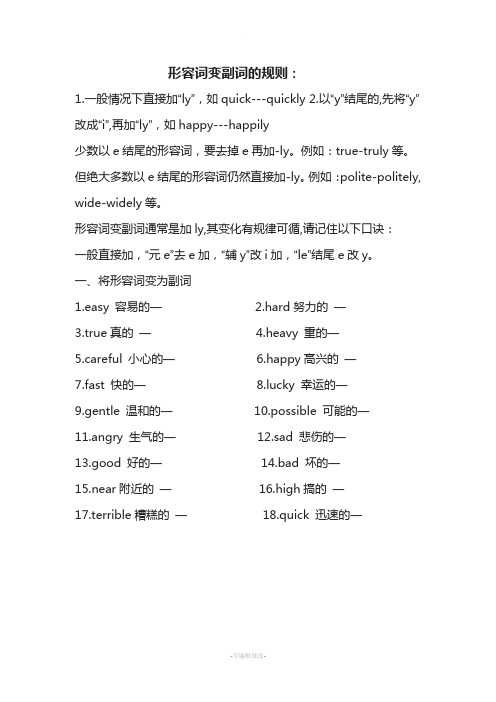
形容词变副词的规则:
1.一般情况下直接加“ly”,如quick---quickly
2.以“y”结尾的,先将“y”改成“i”,再加“ly”,如happy---happily
少数以e结尾的形容词,要去掉e再加-ly。
例如:true-truly等。
但绝大多数以e结尾的形容词仍然直接加-ly。
例如:polite-politely, wide-widely等。
形容词变副词通常是加ly,其变化有规律可循,请记住以下口诀:
一般直接加,“元e”去e加,“辅y”改i加,“le”结尾e改y。
一、将形容词变为副词
1.easy 容易的—
2.hard努力的—
3.true真的—
4.heavy 重的—
5.careful 小心的—
6.happy高兴的—
7.fast 快的—8.lucky 幸运的—
9.gentle 温和的—10.possible 可能的—
11.angry 生气的—12.sad 悲伤的—
13.good 好的—14.bad 坏的—
15.near附近的—16.high搞的—
17.terrible糟糕的—18.quick 迅速的—
THANKS !!!
致力为企业和个人提供合同协议,策划案计划书,学习课件等等
打造全网一站式需求
欢迎您的下载,资料仅供参考。
形容词变副词变化规则ppt课件

③以le结尾时,去e加y,如:
simple---simply; considerable---considerably;
terrible---terribly; gentle---gently; possible---
possibly; probable---probably; incredible---
整理版课件
6
5). 以-ll结尾时,只须加 –y,如: dull---dully;
注意: 有些以ly结尾的词是形容词而非副词。 如:
friendly people; motherly care; lovely dog;
整理版课件
7
感谢亲观看此幻灯片,此课件部分内容来源于网络, 如有侵权请及时联系我们删除,谢谢配合!
整理版课件
5
4).以ic 结尾的词,加ally,如:
economic---economically; basic---basically; scientific---scientifically; automatic--automatically; energetic---energetically
incredibly
整理版课件
4
3). 以―个y结尾的,且读音为 / i /, 先将y改 成i,再加ly,如:
happy---happily; heavy---heavily; angry---angrily; busy---busily 但是如果读音为 / ai /, 直接加ly,如:
dry-dryly; shy---shyly
形容词变副词变化规则
整理版课件
1
1. 一般情况直接加-ly 2. 以-e结尾的①少数去e加ly
②绝大多数直接加-ly ③以-le结尾变为-ly 3. 以-y结尾的①读/i/ 把y变i加-ly ②读/ai/直接加-ly 4. 以-ic结尾的,加-ally 5. 以-ll结尾,直接加-y
形容词变副词的规律及练习大全(含答案)

形容词变副词的规律及练习大全(含答案)true---XXXpolite---politelywide---widelypossible---possiblyreal---reallyhelpful---XXXwhole---XXXcareful---carefullyhopeful---hopefullybusy---XXXangry---angrilyeasy---easilyterrible---XXXgentle---XXXsimple---simplyheavy---XXXwise---wiselyfull---fullybasic---basically automatic---automatically absolute---absolutely early---earlynoisy---noisilyheavy---XXXXXX---XXXfast---fastearly---earlyhard---hardlate---XXXfar---farcareful---carefully careless---carelessly different---differently successful---successfully safe---safelywise---wiselyfortablyXXX---XXXmessy---messilyguilt---guiltilyoptimistic---optimisticallyenergetic---XXXstable---stablyXXX---XXXTrue XXX who is always there for you。
no matter what。
They listen to you when you need to talk。
and they give you advice when you need it。
A good friend is someone who is honest with you。
英语形容词变副词规则(名词改为副词)

英语形容词变副词规则(名词改为副词)
英语中,形容词在需要表达一种动作或状态的副词时,可以通过一定的规则变成副词形式。
下面是一些常见的形容词变副词的规则:
1. 一般情况下,形容词可以通过在其后面加上 -ly 后缀来变成副词。
例如:
- quick(快的)→ quickly(快速地)
- easy(容易的)→ easily(容易地)
2. 以字母 e 结尾的形容词,直接加上 -ly 后缀。
例如:
- sincere(真诚的)→ sincerely(真诚地)
- brave(勇敢的)→ bravely(勇敢地)
3. 以辅音字母 + y 结尾的形容词,去掉 y,改为 i,然后加上 -ly 后缀。
例如:
- happy(快乐的)→ happily(快乐地)
- angry(生气的)→ angrily(生气地)
4. 以 -le 结尾的形容词,将 e 变为 y,再加上 -ly 后缀。
例如:
- ___(温和的)→ ___(温和地)
- simple(简单的)→ simply(简单地)
5. 以 -ic 结尾的形容词,直接加上 -ally 后缀。
例如:
- automatic(自动的)→ automatically(自动地)
- fantastic(极好的)→ fantastically(极好地)
需要注意的是,这些只是一些常见形容词变副词的规则,还有一些特殊情况可能需要单独处理。
在写作中,可以根据这些规则来转换形容词为副词,以更准确地描述动作或状态。
形容词到副词变化规则
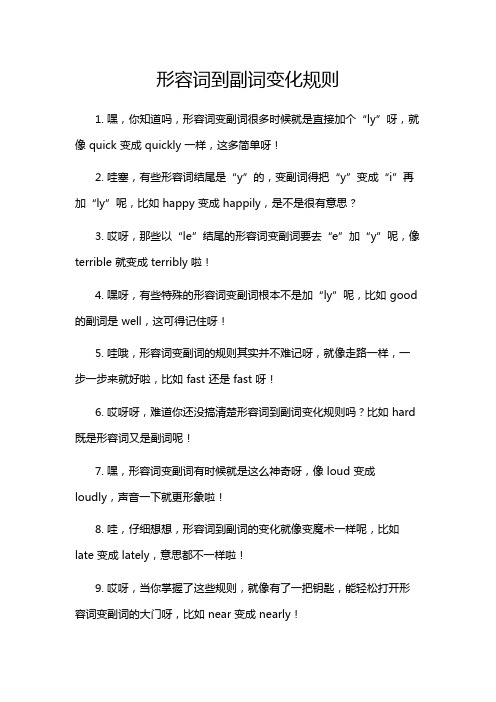
形容词到副词变化规则1. 嘿,你知道吗,形容词变副词很多时候就是直接加个“ly”呀,就像 quick 变成 quickly 一样,这多简单呀!2. 哇塞,有些形容词结尾是“y”的,变副词得把“y”变成“i”再加“ly”呢,比如 happy 变成 happily,是不是很有意思?3. 哎呀,那些以“le”结尾的形容词变副词要去“e”加“y”呢,像terrible 就变成 terribly 啦!4. 嘿呀,有些特殊的形容词变副词根本不是加“ly”呢,比如 good 的副词是 well,这可得记住呀!5. 哇哦,形容词变副词的规则其实并不难记呀,就像走路一样,一步一步来就好啦,比如 fast 还是 fast 呀!6. 哎呀呀,难道你还没搞清楚形容词到副词变化规则吗?比如 hard 既是形容词又是副词呢!7. 嘿,形容词变副词有时候就是这么神奇呀,像 loud 变成loudly,声音一下就更形象啦!8. 哇,仔细想想,形容词到副词的变化就像变魔术一样呢,比如late 变成 lately,意思都不一样啦!9. 哎呀,当你掌握了这些规则,就像有了一把钥匙,能轻松打开形容词变副词的大门呀,比如 near 变成 nearly!10. 嘿呀,是不是觉得形容词到副词变化规则很有趣呀,像 pretty 变成 prettily,多可爱呀!11. 哇哦,其实记住这些规则并不难呀,就像记住好朋友的特点一样,比如 early 就是直接加“ly”呀!12. 哎呀呀,形容词变副词的世界真是丰富多彩呀,像 slow 变成slowly,慢慢来的感觉就有啦!13. 嘿,大家都来看看呀,形容词到副词变化规则真的超有用呢,比如 quick 变成 quickly 能让描述更准确呀!14. 哇,你瞧,形容词变副词就像是给词语穿上了合适的鞋子,比如careful 变成 carefully 走得更稳啦!15. 哎呀,这些规则就像是游戏规则一样,掌握了就能玩得转呀,比如 sudden 变成 suddenly 很突然呢!16. 嘿呀,形容词到副词变化还真是有很多奇妙之处呀,比如friendly 还是 friendly 呢!17. 哇哦,学会了这些规则,就像拥有了魔法棒呀,比如 easy 变成easily 变得好简单呀!18. 哎呀呀,形容词变副词可别搞混啦,比如 real 变成 really,差别很大呢!19. 嘿,这形容词到副词变化规则真的是很关键呀,比如 final 变成finally,终于的感觉就出来啦!20. 哇,大家一定要好好记住这些规则呀,它们能让我们的语言更丰富呢!观点结论:形容词到副词的变化规则虽然有一些特殊情况,但总体来说并不难掌握,只要多留意多练习,就能运用自如啦!。
1形容词变副词和练习

形容词变副词规律和练习1.大部分形容词加ly变成副词careful----carefully careless----carelessly quick---quicklyquiet----quietly different----differently successful--- successfully2.不用去掉字母e:polite--politely safe—safely wide--widely, wise(聪明的/明智的)--wisely(聪明地/明智地)注意:唯一一个去e: true----truly(真的没e)3. .以le结尾的形容词变le为lypossible----possibly comfortable----comfortably terrible----terribly4.以y结尾的形容词变y为i加lyeasy----easily angry----angrily noisy----noisilyhappy----happily heavy----heavily healthy----healthily5. 本身既是形容词也是副词,无需改变fast----fast early----early hard----hard late----late far----far6. 虽然以ly结尾,但却是形容词,不能用来修饰动词friendly lively:活泼的,生动的lovely:可爱的,lonely:孤独的7. 形容词和副词为完全不同的单词好:good----well8.wide(形容词,宽阔的)-----widely(副词,广泛地)9. hard:①形容词:硬的,难的②副词:努力地;hardly:“几乎不”(与hard毫无关系)10. weekly:①.形容词:每周的②副词:每周地daily:①.形容词:每日的②副词:每日地alone:①形容词:独自,一个人的②副词:独自地lonely: 形容词:孤独的练习1.Look at the children on the playground. They are flying kites___________(愉快).Let’s join them.2.Why do you think you did so ____________(糟糕) in your test?3.We can __________(容易) forgive(原谅) a child who is afraid of the dark, but wecan’t forgive an adult()who is afraid of the light.4.Congratulations! You’ve answered all the Questions _____________(correct)5.The computer is __________(广泛) used in our daily life.6.I changed into my sports shoes so that I could walk more ___________(comfortable).7.Mary passed her examination because she studied very __________(hard).8.“Why didn’t you tell me earlier?” The boss shouted ___________(生气)9.It’s ________(true) possible that robot teachers will be popular in schools some day.10.How___________ (comfortable) the giant pandas are living in Taiwan.11.Miss Xu smiled and said to me _____(soft),“ Never mind ,my boy!”st night rained ______ /______(大) in the southern part of the city.13.The children clapped their hands__________(兴奋) as soon as the astronauts appeared on the stage.14.Tom had an accident yesterday. His teacher sent him to the hospital _________(快). 15We should speak to the old man __________(polite).16.I’m________(true) sorry I can’t go with you. I have a lot to do this afternoon.17. His father was running to his home________(饿) because he didn’t have meals today.18.Mike walked__________(quiet) into the room not to wake up his grandpa.19.How_________(quick) Betty answered the teacher’s question!20. The foremen have saved the boy from the fire____________(successful).21.Simon hates to be like others, he often tries to do everything___________(不同).22. Does your father walk _________ up with you?A. fast enough to catchB. enough fast catchingC. enough fast to catchD. fast enough catching23.--How was the weather yesterday? --It was terrible. It rained _______all day.A. stronglyB. heavilyC. hardlyD. badly24. People in different countries behave()______ when they eat dinner.A. politelyB. differentlyC. healthilyD. quietly25.---Is the physics problem _______?---Yes. I can work it out _______.A. easy; easilyB. easy; easyC. easily; easyD. easily; easier26.The busier he is, the _____ he feels.A. happilyB. happyC. happierD. more happy27. Her mother was out. She stayed at home_______, but she didn't feel _______.A. alone, lonelyB. lonely lonelyC. alone, aloneD. lonely, alone28. I got up______today. A. later B. more lately C. lately D. late29. What a ___ cough! You seen ___ill.A. terrible, terriblyB. terribly, terribleC. terrible, terribleD. terribly, terribly30. —What was the weather like yesterday?—It was very bad. It rained ______ people could _______ go out.A. hard, hardB. hardly, hardC. hardly, hardlyD. hard, hardly31. Alice_______goes to school at seven. A. usual B. usually C. hard D. a little32. You must wear glasses. They can keep your eyes___.A. softB. safeC. safelyD. safety33. Would you please speak_______? I still can't follow you.A. slowB. much slowC. much slowlyD. more slowly34. These oranges taste________. A. good B. well C. to be good D. to be well35.Don’t feel_________(worry) about your child. The whole class would be_________ (friend) to the new classmate.36.The children in China are living a __________ (color) life.37.The night was very ___, so he had to take off his shoes ___.A. quiet; quietlyB. quite; quicklyC. late; quickD. quite; quietly38.He____ to school to clean his classroom.A. always comes earlyB. comes always earlyC. always early comesD. come always earlier。
形容词变副词的一般规则--中考必考

形容词变副词一,变化规则如下:1.一般情况下直接加“ly”,如:quick-quickly; polite-politely; sad-sadly; immediate-immediately; recent-recently wide-widely; wise-wisely; nice-nicely careless—carelessly close--closely quiet—quietly different—differently confident—confidently beautiful—beautifully careful—carefully proper--properly2. 少数以e结尾的形容词,要去掉e再加-y。
如:terrible — terribly possible— possibly comfortable— comfortably gentle—gently simple—simply reasonable—reasonably probable—probably 但是whole-wholly true-truly;例外3. 以“y”结尾的,且读音为/ i /,先将“y”改成“i”,再加“ly”,如:lucky-luckily; happy-happily; heavy-heavily; angry-angrily; busy-busily;但是如果读音为/ ai /,直接加ly,如:dry-dryly; sly-slyly; shy---shyly4. 以ic 结尾的词,加ally,如:economic-economically; basic-basically; scientific-scientifically; automatic-automatically;energetic-energetically; 但是public-publicly 例外5. 以-ll结尾时,只须加–y,如:dull-dully; shrill-shrilly full- fully需注意: 有些以ly结尾的词是形容词而非副词。
形容词变副词的规律及练习大全(含答案)
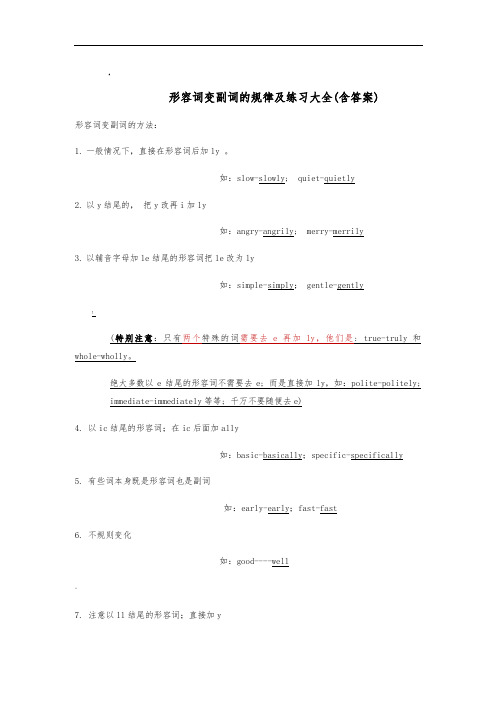
,形容词变副词的规律及练习大全(含答案)形容词变副词的方法:1.一般情况下,直接在形容词后加ly 。
如:slow-slowly; quiet-quietly2.以y结尾的,把y改再i加ly如:angry-angrily; merry-merrily3.以辅音字母加le结尾的形容词把le改为ly如:simple-simply; gentle-gently !(特别注意:只有两个特殊的词需要去e再加ly,他们是: true-truly 和whole-wholly。
绝大多数以e结尾的形容词不需要去e; 而是直接加ly,如:polite-politely;immediate-immediately等等; 千万不要随便去e)4.以ic结尾的形容词;在ic后面加ally如:basic-basically;specific-specifically5.有些词本身既是形容词也是副词如:early-early;fast-fast6.不规则变化如:good----well"7. 注意以ll结尾的形容词;直接加y如:full-fully; dull--dully 一,把下列形容词变为副词noisy---- heavy---- healthy----…fast----early----hard----late----far----careful---- careless---- different---- |successful--- safe—wise-- comfortable---- lucky---messy--guilt--optimistic--?energetic-- stable-- unbelievable--noisy----noisily*heavy----heavilyhealthy----healthilyfast----fastearly----earlyhard----hardlate----latefar----farcareful----carefully^careless----carelessly different----differently successful--- successfully safe—safelywise--wiselycomfortable----comfortably lucky---luckilymessy--messilyguilt--guiltilyoptimistic--optimistically energetic--energetically stable--stablyunbelievable--unbelievably。
《形容词变副词》课件

例如,“happy”变为副词时变为 “happily”,“easy”变为副词时变 为“easily”,这些变化并非遵循一般 的规则,因此需要特别注意并记忆。
误用副词的位置
总结词
副词的位置在句子中非常重要,如果放置不当,会影响句子的意思。
详细描述
副词通常放在动词之前,形容词之后。例如,“She runs quickly.”在这个句子中,“quickly”是副词,放在动 词“runs”之前。如果将其放在形容词之后,如“She is quickly now.”则改变了句子的意思。因此,在将形容 词变为副词时,需要注意副词的位置。
混淆形容词与副词是常见的错误,因为两者在语法和用法上有很大的区别。
详细描述
形容词用于描述名词或代词的特征或属性,而副词则用于描述动词、形容词或 整个句子的方式、时间、地点等。因此,在将形容词转换为副词时,需要注意 其语法功能和用法。
不规则变化
总结词
一些形容词在变为副词时,其变化是 不规则的,需要特别记忆。
《形容词变副词》 ppt课件
xx年xx月xx日
• 形容词与副词的定义 • 形容词变副词的规则 • 形容词变副词的常见错误 • 练习与巩固 • 总结与回顾
目录
01
形容词与副词的定义
形容词定义
形容词
用来描述名词或代词特征或属性 的词,如“美丽的”、“勇敢的 ”。
形容词的作用
使句子更具体、生动,帮助读者 更好地理解名词或代词所指的对 象。
04
练习与巩固
单项选择题
总结词
考察学生对形容词变 副词规则的掌握程度
详细描述
提供一系列形容词, 要求学生选择正确的 副词形式。例如
正确选项
形容词副词的比较级和最高级变化规则(附习题+答案)

形容词/副词的比较级和最高级变化规则(附习题+答案)1、单音节词和少数以-er,-ow结尾的双音节单词,比较级在后面加-er,最高级在后面加-est。
① 单音节单词small→smaller→smallestshort→shorter→shortesttall→taller→tallestgreat→greater→greatest① 少数以-er,-ow结尾的双音节单词clever→cleverer→cleverestnarrow→narrower→narrowest2、以不发音e结尾的单音节单词,比较级在原级后加-r,最高级在原级后加-st。
large→larger→largestnice→nicer→nicestable→abler→ablest3、以一个辅音字母结尾的闭音节(即:辅音+元音+辅音)单词中,先双写末尾的辅音字母,比较级加-er,最高级加-est。
big→bigger→biggesthot→hotter→hottestfat→fatter→fattest4、以“辅音字母+y”结尾的双音节词,把y改为i,比较级加-er,最高级加-est。
easy→easier→easiestheavy→heavier→heaviestbusy→busier→busiesthappy→happier→happiest5、其他双音节词和多音节词,比较级在前面加more,最高级在前面加most。
beautiful→more beautiful→most beautifuldifferent→more different→most differenteasily→more easily→most easily6、有少数形容词、副词的比较级和最高级是不规则的,必须熟记。
good→better→bestwell→better→bestbad→worse→worstill→worse→worstold→older/elder→oldest/eldestmany/much→more→mostlittle→less→leastfar →further/farther→ furthest/farthest练习题一、根据句意,用所括号内所级形容词的比较等级形式填空。
英语形容词变副词的变化规则
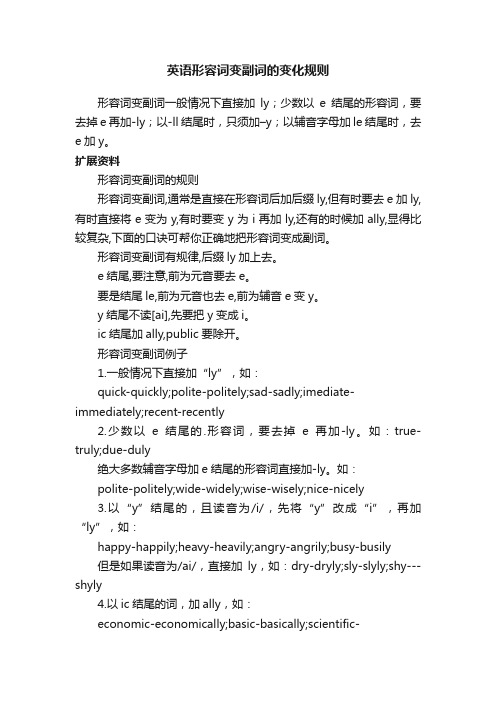
英语形容词变副词的变化规则形容词变副词一般情况下直接加ly;少数以e结尾的形容词,要去掉e再加-ly;以-ll结尾时,只须加–y;以辅音字母加le结尾时,去e加y。
扩展资料形容词变副词的规则形容词变副词,通常是直接在形容词后加后缀ly,但有时要去e加ly,有时直接将e变为y,有时要变y为i再加ly,还有的时候加ally,显得比较复杂,下面的口诀可帮你正确地把形容词变成副词。
形容词变副词有规律,后缀ly加上去。
e结尾,要注意,前为元音要去e。
要是结尾le,前为元音也去e,前为辅音e变y。
y结尾不读[ai],先要把y变成i。
ic结尾加ally,public要除开。
形容词变副词例子1.一般情况下直接加“ly”,如:quick-quickly;polite-politely;sad-sadly;imediate-immediately;recent-recently2.少数以e结尾的.形容词,要去掉e再加-ly。
如:true-truly;due-duly绝大多数辅音字母加e结尾的形容词直接加-ly。
如:polite-politely;wide-widely;wise-wisely;nice-nicely3.以“y”结尾的,且读音为/i/,先将“y”改成“i”,再加“ly”,如:happy-happily;heavy-heavily;angry-angrily;busy-busily但是如果读音为/ai/,直接加ly,如:dry-dryly;sly-slyly;shy---shyly4.以ic结尾的词,加ally,如:economic-economically;basic-basically;scientific-scientifically;automatic-automatically;energetic-energetically;但是public-publicly例外。
5.以辅音字母加le结尾时,去e加y,如:simple-simply;considerable-considerably;terrible-terriblygentle-gently;possible-possibly;probable-probably;incredible-incredibly元音字母加le时加ly,如:sole-solely。
形容词变副词的一般规则
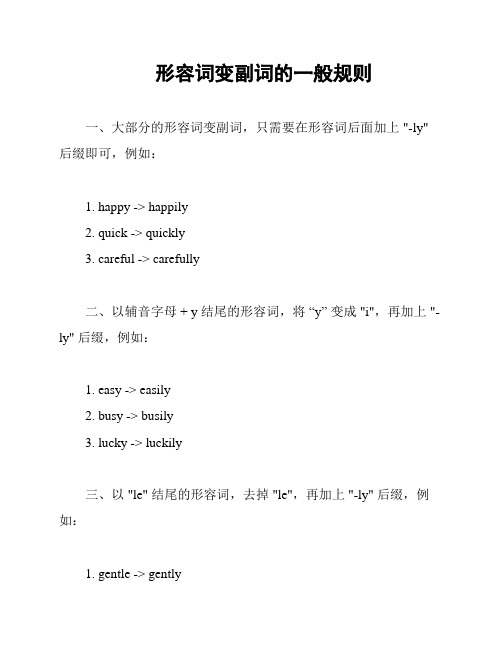
形容词变副词的一般规则一、大部分的形容词变副词,只需要在形容词后面加上 "-ly" 后缀即可,例如:1. happy -> happily2. quick -> quickly3. careful -> carefully二、以辅音字母 + y 结尾的形容词,将“y” 变成 "i",再加上 "-ly" 后缀,例如:1. easy -> easily2. busy -> busily3. lucky -> luckily三、以 "le" 结尾的形容词,去掉 "le",再加上 "-ly" 后缀,例如:1. gentle -> gently2. simple -> simply3. visible -> visibly四、以 "-ic" 结尾的形容词,将 "-ic" 替换为 "-ically" 后缀,例如:1. economic -> economically2. fantastic -> fantastically3. tragic -> tragically五、以 "-al" 结尾的形容词,将 "-al" 替换为 "-ally" 后缀,例如:1. gradual -> gradually2. natural -> naturally3. normal -> normally六、以 "-y" 结尾的形容词,直接加上 "-ily" 后缀,例如:1. angry -> angrily2. ugly -> uglily3. lively -> lively需要注意的是,有一些形容词的副词形式并不遵循以上规则,而有固定的变化方式,需要单独记忆,如:1. good -> well2. hard -> hard3. fast -> fast以上是形容词变副词的一般规则,希望对您有所帮助。
1形容词变副词和练习
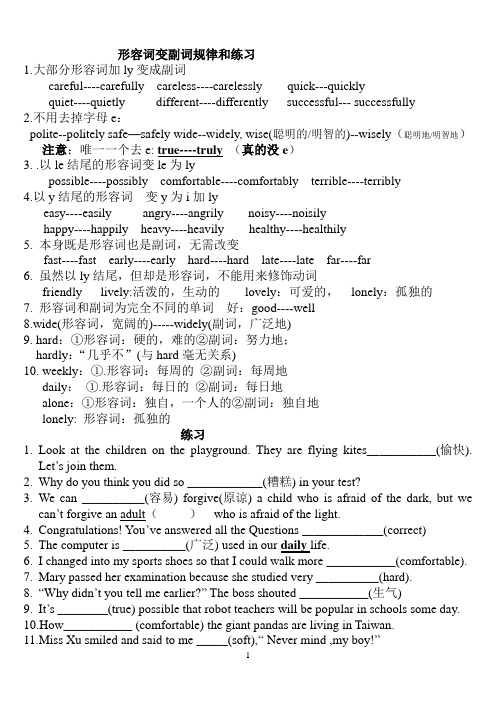
形容词变副词规律和练习1.大部分形容词加ly变成副词careful----carefully careless----carelessly quick---quicklyquiet----quietly different----differently successful--- successfully2.不用去掉字母e:polite--politely safe—safely wide--widely, wise(聪明的/明智的)--wisely(聪明地/明智地)注意:唯一一个去e: true----truly(真的没e)3. .以le结尾的形容词变le为lypossible----possibly comfortable----comfortably terrible----terribly4.以y结尾的形容词变y为i加lyeasy----easily angry----angrily noisy----noisilyhappy----happily heavy----heavily healthy----healthily5. 本身既是形容词也是副词,无需改变fast----fast early----early hard----hard late----late far----far6. 虽然以ly结尾,但却是形容词,不能用来修饰动词friendly lively:活泼的,生动的lovely:可爱的,lonely:孤独的7. 形容词和副词为完全不同的单词好:good----well8.wide(形容词,宽阔的)-----widely(副词,广泛地)9. hard:①形容词:硬的,难的②副词:努力地;hardly:“几乎不”(与hard毫无关系)10. weekly:①.形容词:每周的②副词:每周地daily:①.形容词:每日的②副词:每日地alone:①形容词:独自,一个人的②副词:独自地lonely: 形容词:孤独的练习1.Look at the children on the playground. They are flying kites___________(愉快).Let’s join them.2.Why do you think you did so ____________(糟糕) in your test?3.We can __________(容易) forgive(原谅) a child who is afraid of the dark, but wecan’t forgive an adult()who is afraid of the light.4.Congratulations! You’ve answered all the Questions _____________(correct)5.The computer is __________(广泛) used in our daily life.6.I changed into my sports shoes so that I could walk more ___________(comfortable).7.Mary passed her examination because she studied very __________(hard).8.“Why didn’t you tell me earlier?” The boss shouted ___________(生气)9.It’s ________(true) possible that robot teachers will be popular in schools some day.10.How___________ (comfortable) the giant pandas are living in Taiwan.11.Miss Xu smiled and said to me _____(soft),“ Never mind ,my boy!”st night rained ______ /______(大) in the southern part of the city.13.The children clapped their hands__________(兴奋) as soon as the astronauts appeared on the stage.14.Tom had an accident yesterday. His teacher sent him to the hospital _________(快). 15We should speak to the old man __________(polite).16.I’m________(true) sorry I can’t go with you. I have a lot to do this afternoon.17. His father was running to his home________(饿) because he didn’t have meals today.18.Mike walked__________(quiet) into the room not to wake up his grandpa.19.How_________(quick) Betty answered the teacher’s question!20. The foremen have saved the boy from the fire____________(successful).21.Simon hates to be like others, he often tries to do everything___________(不同).22. Does your father walk _________ up with you?A. fast enough to catchB. enough fast catchingC. enough fast to catchD. fast enough catching23.--How was the weather yesterday? --It was terrible. It rained _______all day.A. stronglyB. heavilyC. hardlyD. badly24. People in different countries behave()______ when they eat dinner.A. politelyB. differentlyC. healthilyD. quietly25.---Is the physics problem _______?---Yes. I can work it out _______.A. easy; easilyB. easy; easyC. easily; easyD. easily; easier26.The busier he is, the _____ he feels.A. happilyB. happyC. happierD. more happy27. Her mother was out. She stayed at home_______, but she didn't feel _______.A. alone, lonelyB. lonely lonelyC. alone, aloneD. lonely, alone28. I got up______today. A. later B. more lately C. lately D. late29. What a ___ cough!A. terrible, terriblyB. terribly, terribleC. terrible, terribleD. terribly, terribly30. —What was the weather like yesterday?—It was very bad. It rained ______ people could _____A. hard, hardB. hardly, hardC. hardly, hardlyD. hard, hardly31. Alice_______goes to school at seven. A. usual B. usually C. hard D. a little32. You must wear glasses. They can keep your eyes___.A. softB. safeC. safelyD. safety33. Would you please speak_____A. slowB. much slowly D. more slowly34. These oranges taste________. A. good B. well C. to be good D. to be well35.Don’t feel_________(worry) about your child. The whole class would be_________ (friend) to the new classmate.36.The children in China are living a __________ (color) life.37.The night was very ___, so he had to take off his shoes ___.A. quiet; quietlyB. quite; quicklyC. late; quickD. quite; quietly38.He____ to school to clean his classroom.A. always comes earlyB. comes always earlyC. always early comesD. come always earlier。
形容词变副词规则

形容词变副词规则在英语中,形容词是用来描述名词的词语,而副词则是用来描述动词、形容词或其他副词的词语。
形容词变成副词的规则有很多种,下面我们来详细了解一下。
1. 一般情况下,将形容词变成副词时,在形容词的词尾加上 -ly。
例如:quick(形容词)→quickly(副词)、slow(形容词)→slowly(副词)。
2. 对于以 -y 结尾的形容词,将 -y 变为 -ily。
例如:happy (形容词)→happily(副词)、easy(形容词)→easily(副词)。
3. 对于以 -le 结尾的形容词,通常将 -le 变为 -ly。
例如:gentle(形容词)→gently(副词)、simple(形容词)→simply (副词)。
4. 对于以 -ic 结尾的形容词,通常将 -ic 变为 -ically。
例如:fantastic(形容词)→fantastically(副词)、dramatic(形容词)→dramatically(副词)。
5. 一些形容词的副词形式与形容词形式相同,例如:fast、hard、late、early 等。
6. 一些形容词的副词形式是不规则的,需要特别记忆。
例如:good(形容词)→well(副词)、bad(形容词)→badly(副词)。
7. 有些形容词没有副词形式,需要通过其他方式来表达副词的意思。
例如:true(形容词)→truly(以副词形式)、real(形容词)→really(以副词形式)。
总的来说,形容词变副词的规则并不复杂,大部分情况下只需要在形容词的词尾加上 -ly 就可以了。
但也有一些例外情况,需要特别注意和记忆。
熟练掌握形容词变副词的规则对于学习英语语法和提高英语表达能力都是非常重要的。
除了掌握规则外,还需要通过大量的阅读和实践来加深对形容词和副词的理解和运用。
希望通过本文的介绍,读者们能够更加清晰地掌握形容词变副词的规则,从而在英语学习中取得更好的成绩。
新概念英语第一册Lesson 73 形容词变副词变化规则

形容词变副词口诀:
形容词变副词通常是加ly,其变化有规律可循,请记住以下口诀:
一般直接加,“元e”去e加,“辅y”改i加,“le”结尾e改y。
分别举例如下:
quick—quickly, true—truly, happy—happily, possible—possibly
不规则变化:
1.本身既是形容词也是副词,无需改变:
fast----fast,early----early,high----high,hard----hard,
late----late,far----far,wide----wide,alone----alone
2.虽然以ly结尾,但却是形容词,不能直接用来修饰动词:
friendly,lively,lovely,lonely,likely, motherly, manly等。
3.有些形容词本身即为副词,同时也有加-ly的副词形式。
但加不加ly意思不一样,使用时需注意,如:
late(形容词,晚的)---late(副词,晚地),lately(最近)
high(形容词,高的)--high(副词,高地),highly(副词,高度地,恨非常) hard副词容易写成hardly, hardly意思为“几乎不”,与hard无任何关系。
- 1、下载文档前请自行甄别文档内容的完整性,平台不提供额外的编辑、内容补充、找答案等附加服务。
- 2、"仅部分预览"的文档,不可在线预览部分如存在完整性等问题,可反馈申请退款(可完整预览的文档不适用该条件!)。
- 3、如文档侵犯您的权益,请联系客服反馈,我们会尽快为您处理(人工客服工作时间:9:00-18:30)。
容易拼错
healthy
healthily
容易拼错
polite
politely
不用去掉字母e。类似的词还有:
widely, nicely, closely,
中考试题汇编
1. Look at the children on the playground. They are flying kites ________(愉快地). Let’s join
an adult who is afraid of the light. (09盐城)
6. Congratulations! You’ve answered all the questions _________(正确地). (09常州)
7. The computer is ______(广泛)used in our daily life. We can do many things with it. (08常州)
Friendly
(以ly结尾,但却是形容词)
类似的还有motherly,lively,fatherly,weekly
无
不能用friendly直接修饰动词,只能改成in a friendly way“用一种友好的方式”。如:
He smiled at me in a friendly way.
excited
14. Miss Xu smiled and said to me ________(soft), “Never mind, my boy!” (2010淮安)
15. Last night it rained __________(heavy) in the southern part of the city. (2010无锡)
10. “Why didn’t you tell me earlier?” The boss shouted _______(生气). (08镇江)
11. If you answer all these questions __________(correct), you will be the winner. (2010南通)
wide----widealone----alone
形容词和副词为完全不同的单词
good----well
初中阶段唯一一个需要去掉字母e的单词
true----truly
虽然以ly结尾,但却是形容词,不能直接用来修饰动词
Friendlylively
Lovelylonely
likely
有些形容词本身即为副词,同时也有加ly的副词形式。但加不加ly意思不一样,使用时需注意
12. It’s ___(true) possible that robot teachers will be popular in schools some day. (2010扬州)
13. How _________(comfortable) the giant pandas are living in Taiwan! (2010淮安)
形容词变副词的规则
范围
变化规则
例词
大部分形容词
加ly
careless----carelesslyquiet----quietly
different----differently
以le结尾的形容词
变le为ly
possible----possiblyterrible----terribly
comfortable----comfortablysimple----simply
4. With the help all over the world, the children in Sichuan are living _________(幸福地)
5. We can __________(容易地) forgive a child who is afraid of the dark, but we can’t forgive
18. ----Where is Peter from? (09南京)
----He is French, if I remember _________(correct).
them. (2010南京)
2. Mrs White smiled ___________(幸福地) when she received a present from her daughter on
Mother’s Day. (2010徐州)
3. Why do you think you did so ___________(糟糕地)in your test? (09苏州)
以y结尾的形容词
变y为ily
easy----easilyangry----angrily
happy----happilyheavy----heavily
不规则变化
本身既是形容词也是副词,无需改变
fast----fastearly----early
high----highhard----hard
late----latefar----far
16. This year it has rained so ______(heavy) in South China that lots of problems are caused.
17. Simon hates to be like others, he often tires to do everything ______(different). (2010徐州)
8. I changed into my sports shoes so that I could walk more ____________(舒服地). (09苏州)
9. Mary passed her examination because she studied very ________(努力). (08徐州)
wide(形容词,宽阔的,睁大的)----wide(副词,睁大地)/widely(副ห้องสมุดไป่ตู้,广泛地)
high(形容词,高的)----high(副词,高地)/highly(副词,高度地)
特别容易犯错的副词
形容词
副词
备注
hard
hard
hard副词容易写成hardly, hardly意思为“几乎不”,与hard无任何关系
